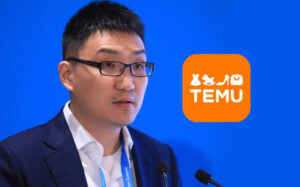In a dramatic turn of events, the once-richest person in China, Colin Huang, has seen his net worth plummet by a staggering $14 billion. This massive loss comes on the heels of his company, PDD Holdings, the parent of the popular online marketplace Temu, reporting disappointing second-quarter financial results.

PDD Holdings, previously known as Pinduoduo, saw its stock price tumble by almost 30% on Monday, trading at just $97.35 per share, a far cry from its previous high. This dramatic drop in the company’s stock price has had a significant impact on Huang’s personal wealth, pushing him down the Forbes real-time billionaires list to the 50th spot globally and the 4th spot in China.
The company’s financial woes stem from missed earnings and revenue estimates for the second quarter. PDD Holdings reported diluted earnings of 23.24 yuan ($3.20) per share, missing analysts’ expectations. Similarly, the company’s sales of 97.06 billion yuan ($13.64 billion) fell short of the expected 100.17 yuan ($14.1 billion).
Jun Liu, the vice president of finance at PDD, acknowledged that the company’s revenue growth rate has slowed quarter-to-quarter and is likely to continue due to “intensified competition and external challenges.” The CEO of PDD, Lei Chen, further stated that the company is willing to make “short-term sacrifices” as it invests in the business.
The struggles faced by PDD Holdings are not unique to the company. Other major online marketplaces in China, such as Alibaba and JD.com, have also reported missed expectations amidst the country’s economic downturn. With high unemployment rates and falling household income, young Chinese consumers are increasingly adopting a “revenge saving” trend, where they aim to save more than previous generations, further exacerbating the challenges faced by these companies.
Despite the current setbacks, Huang’s net worth is still substantial, valued at $35.3 billion as of Monday’s close. However, this represents a significant drop of more than 28% from his peak net worth of $55.3 billion in 2021. Huang, who founded Pinduoduo (now PDD Holdings) in 2015, has seen his wealth fluctuate over the years, reaching an average of $38.9 billion so far this year.
The company’s recent woes have also brought attention to its online marketplace, Temu, which was launched in 2022 as a budget-friendly competitor to the popular fast-fashion app Shein. The comparison between Temu and Shein has drawn both positive and negative attention, with Shein even suing Temu for alleged copyright infringement, claiming the rival platform sells counterfeit products.
As the Chinese economy continues to navigate uncertain times, the fate of PDD Holdings and its charismatic founder, Colin Huang, remains a closely watched story in the world of e-commerce and entrepreneurship. The company’s ability to adapt and overcome the current challenges will be crucial in determining whether Huang can reclaim his position as China’s richest person.
In a dramatic turn of events, the once-richest person in China, Colin Huang, has seen his net worth plummet by a staggering $14 billion. This massive loss comes on the heels of his company, PDD Holdings, the parent of the popular online marketplace Temu, reporting disappointing second-quarter financial results.
PDD Holdings, previously known as Pinduoduo, saw its stock price tumble by almost 30% on Monday, trading at just $97.35 per share, a far cry from its previous high. This dramatic drop in the company’s stock price has had a significant impact on Huang’s personal wealth, pushing him down the Forbes real-time billionaires list to the 50th spot globally and the 4th spot in China.
The company’s financial woes stem from missed earnings and revenue estimates for the second quarter. PDD Holdings reported diluted earnings of 23.24 yuan ($3.20) per share, missing analysts’ expectations. Similarly, the company’s sales of 97.06 billion yuan ($13.64 billion) fell short of the expected 100.17 yuan ($14.1 billion).
Jun Liu, the vice president of finance at PDD, acknowledged that the company’s revenue growth rate has slowed quarter-to-quarter and is likely to continue due to “intensified competition and external challenges.” The CEO of PDD, Lei Chen, further stated that the company is willing to make “short-term sacrifices” as it invests in the business.
The struggles faced by PDD Holdings are not unique to the company. Other major online marketplaces in China, such as Alibaba and JD.com, have also reported missed expectations amidst the country’s economic downturn. With high unemployment rates and falling household income, young Chinese consumers are increasingly adopting a “revenge saving” trend, where they aim to save more than previous generations, further exacerbating the challenges faced by these companies.
Despite the current setbacks, Huang’s net worth is still substantial, valued at $35.3 billion as of Monday’s close. However, this represents a significant drop of more than 28% from his peak net worth of $55.3 billion in 2021. Huang, who founded Pinduoduo (now PDD Holdings) in 2015, has seen his wealth fluctuate over the years, reaching an average of $38.9 billion so far this year.
The company’s recent woes have also brought attention to its online marketplace, Temu, which was launched in 2022 as a budget-friendly competitor to the popular fast-fashion app Shein. The comparison between Temu and Shein has drawn both positive and negative attention, with Shein even suing Temu for alleged copyright infringement, claiming the rival platform sells counterfeit products.
As the Chinese economy continues to navigate uncertain times, the fate of PDD Holdings and its charismatic founder, Colin Huang, remains a closely watched story in the world of e-commerce and entrepreneurship. The company’s ability to adapt and overcome the current challenges will be crucial in determining whether Huang can reclaim his position as China’s richest person.




